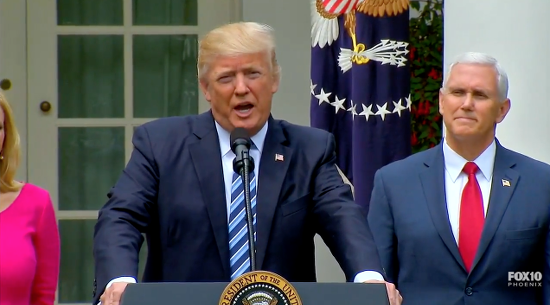It’s been only a few hours since Donald Trump signed an executive order supposedly weakening the Johnson Amendment, but the Freedom From Religion Foundation has sued the President to put a stop to it.

But even if Trump wasn’t able to “totally destroy” the Johnson Amendment, as he promised to do at the National Prayer Breakfast in February, this act of telling the IRS not to enforce the law is a serious problem.
The President is sending a message to churches that endorsing candidates from the pulpit is okay, and that they should go ahead and break the law if they want to.
FFRF is specifically interested in this case because Trump just gave churches permission to tell their members how to vote, while non-profit groups like FFRF that cater to atheists are still forbidden from doing the same thing.
FFRF’s lawsuit is planned to be filed by the end of the day, May 4, in the U.S. District Court, Western District of Wisconsin. FFRF and co-plaintiffs FFRF Executive Directors Dan Barker and Annie Laurie Gaylor assert that Trump has used this order to usher in a new era of church politicking to the exclusion of secular organizations.
…
Among its several abuses, Trump’s order and statements signal to the Internal Revenue Service that it should not enforce the electioneering restrictions of the tax code against churches and religious organizations, while permitting these restrictions to be enforced against secular nonprofits. FFRF asserts the president has no constitutional authority to selectively veto a legitimate statute that Congress passed and a president signed into law more than 50 years ago.
…
The Freedom From Religion Foundation, a 501(c)(3) nonprofit, contends that Trump is violating its equal protection rights and favoring church groups over secular groups, in violation of the Establishment Clause of the First Amendment to the U.S. Constitution. Trump has directed the IRS to do something for which they both lack any enumerated or implied power: to selectively enforce a legitimate statute based solely on religion.
…
“Trump is communicating to churches that his administration will not enforce the Johnson Amendment,” says Gaylor. “The IRS needs clear direction that it must enforce the law equally.”
FFRF is challenging the order on grounds that it violates both the Establishment Clause and the Due Process Clause of the Constitution. They also say Trump acted “in excess of presidential authority under Article II of the Constitution.”
The lawsuit itself can be read here. It’s fascinating to see how often Trump’s own words are used against him. Just as Trump’s executive orders for a Muslim ban were knocked down by judges, FFRF is hoping the legal system will stop this one dead in its tracks.
***Update***: The ACLU also says it plans to sue Trump over this.
***Update 2***: The ACLU says it won’t sue at this time:
“Today’s executive order signing was an elaborate photo-op with no discernible policy outcome. After careful review of the order’s text we have determined that the order does not meaningfully alter the ability of religious institutions or individuals to intervene in the political process. The order portends but does not yet do harm to the provision of reproductive health services.
“President Trump’s prior assertion that he wished to ‘totally destroy’ the Johnson Amendment with this order has proven to be a textbook case of ‘fake news.’
(Image via Shutterstock)




It’s Moving Day for the Friendly ..."
It’s Moving Day for the Friendly ..."
It’s Moving Day for the Friendly ..."
It’s Moving Day for the Friendly ..."